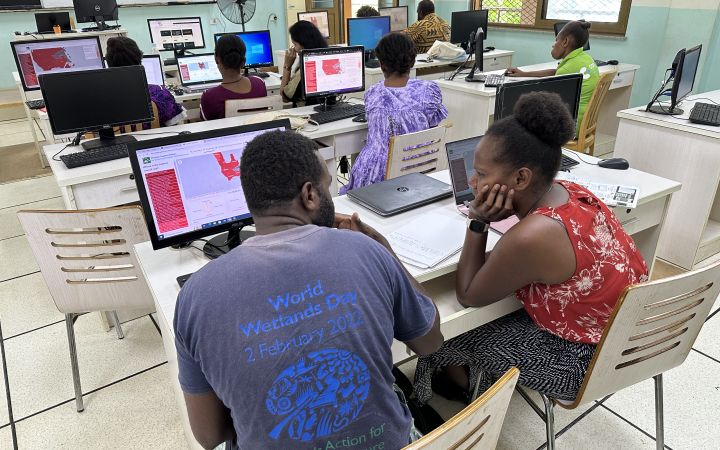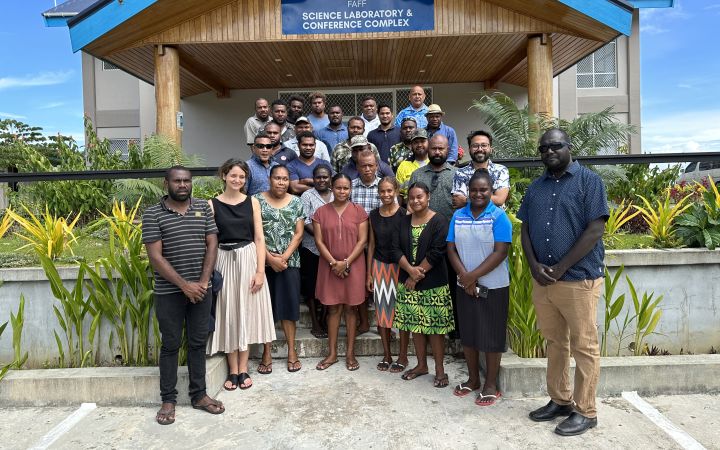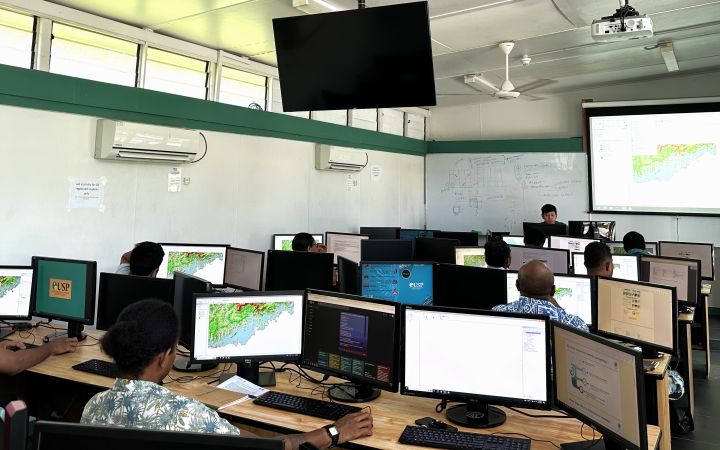09 January 2023, Geneva, Switzerland – UNOSAT experts delivered a series of tailored training in November and December 2022 in 3 countries of the Pacific: Vanuatu, the Solomon Islands, and Fiji. Building upon past activities, these sessions aimed to enhance GIS capacity for Climate Resilience.
The United Nations Satellite Centre (UNOSAT) is currently implementing the project “Strengthening Capacities in the Use of Geospatial Information for Improved Resilience in Asia-Pacific and Africa (2021-2024)”. Building on the legacy of previous activities in the target countries, and supported by well-integrated in-country experts, this flagship project intends to develop sustainable capacities and implement ad-hoc and tailored geospatial solutions in Fiji, Bangladesh, Bhutan, Lao PDR, Nigeria, Solomon Islands, Uganda, and Vanuatu.
In this framework, UNOSAT experts joined the in-country staff in the Pacific in November 2022 to deliver tailored capacity development activities to targeted participants representing the stakeholders in the region.
Kick off in Vanuatu
Starting on 16 November 2022, the first face-to-face training was delivered in Vanuatu at the Emalus Campus thanks to the support of the University of the South Pacific (USP). This week-long training allowed selected participants from the Ministry of Climate Change and academia to strengthen their GIS skills specifically applied to Climate Resilience issues. Tailored to the beneficiaries, the course included lectures and GIS lab exercises using real-case scenarios covering – spatial data management, coastal risk analysis, visualization, and risk mitigation. The participants used UNOSAT Geonode for data published on the web, through which they could easily create and share web maps and dashboards. The hands-on approach enabled the beneficiaries to apply their newly acquired knowledge to meet ongoing challenges.
One of the main challenges for us with GIS is the analysis part. We can pinpoint locations where climate change is affecting communities. Now we have tools that help us with the analysis of the data. This will save time and money, and it will make decisions much more efficient. For example, we deal a lot with sea level rise, and this training has stepped up my capacity in terms of coastal analysis. - Niel Malosu, Data Officer, Meteorology Department, Vanuatu
During the session participants also expressed further ideas for technical backstopping and training activities, which were carefully recorded by the UNOSAT team and will be valuable input for future capacity development planning. This successful collaboration between USP and UNOSAT opens opportunities for bringing together academia, both students and lecturers, with government staff, and developing sustainable capacities in the long term.
This collaborative work with students, staff and stakeholder participation greatly enhanced multiple skills that would be greatly useful in their future endeavours. I am sure this intense knowledge exchange training would bring a new perspective to the participant thinking of using the latest software in accurate predictions and models related to disaster management. In all, we consider this opportunity as a great capacity-building initiative for not only The University of the South Pacific (USP) but Vanuatu as well. Besides thanking UNOSAT for facilitating this opportunity, we look forward to having these in near future as well. - Dr Krishna Kotra, Science Programme Coordinator, USP Emalus Campus, Vanuatu.
Enhancing capacity in the Solomon Islands
On 24 November 2022, the activities continued in the Solomon Islands with the support of the Solomon Islands National University (SINU). The capacity development activities focused on data collection, management and analysis for Disaster Risk Management (DRM) and Climate Resilience.
Spatial information is the foundation of efficient disaster risk management, data preparedness is crucial for an effective response after any crisis event. The training was designed to strengthen the data collection, and analysis skills of multi-sectoral participants from the government, so that they can meet the data demands with respect to DRM, in particular emergency response and recovery.
During an emergency, we need something that is informative, usable and user-friendly. Now the tables we have, being able to put them in a package like that, is very important and I am excited to share this with my colleagues. - Anna Pitaboe, Solomon Islands National Statistics Office
Participants learned how to use survey applications for electronic field data collection, which can increase efficiency in a survey conducted before and after disasters. Participants also explored good practices in data management and learned how to prepare a geospatial database. Finally, in addition to developing foundational knowledge and skills to use open-source GIS software, participants explored, and provided feedback, to Decision Support Systems developed by UNOSAT for the Solomon Islands.
Tailored trainings in Fiji
With an active local GIS community and existing GIS capacity in the partnering ministries of the Fijian government, the learning needs were very specific from various ministries in Fiji. Therefore, UNOSAT experts designed 3 custom-tailored training sessions catering to the needs of the target ministries and different sets of participants were invited to the relevant training sessions.
The Fiji training series started with introductory training on Landslide Susceptibility Mapping. In this one-day intensive session, participants created a landslide susceptibility model from scratch using the weight of evidence method. The training participants appreciated the training and requested to cover more advanced landslide modelling topics.
On the second and third-day participants were introduced to the geospatial methods for building INFORM* Subnational Risk Index. Participants we very much intrigued to see how scientific information, spatial data and census data can be combined using easy-to-understand indicators. INFORM Subnational Risk Index can be used to help develop priorities for risk management, preparedness, and building resilience, support decisions about resource allocation and to monitor risk trends over time.
Finally, the week ended with a two-day advanced training dedicated to Cloud GIS Computing and Web Development. This aimed to build capacity for the technical staff at the Geospatial Information Management Division of the Ministry of Land and Mineral Resources (GIM, MLMR) and the Ministry of Agriculture. The training participants acquired new skills to share, manage and migrate data on ESRI cloud-based applications. Participants were also introduced to different custom coding for modernizing User Experience and User Interface Design (UX/UI).
These three sessions were delivered from 5 to 9 December and hosted by USP in Suva, Fiji to beneficiaries from the Ministry of Lands and Mineral Resources, the Climate Change and International Cooperation Division of the Ministry of Economy, the Ministry of Agriculture, the Fiji Bureau of Statistics and from USP. The participants appreciated the custom-tailored approach as the new skills may assist them to solve some of the pertaining challenges in their work theme and assist evidence-based decision making.
We are learning a lot about Landslide Susceptibility Mapping. Usually, we work based on field assessments, but we have not come up with mapping techniques in terms of GIS. But now that we have learned this, we can use the techniques to inform the public and developers about areas prone to landslides. This is important risk information. - Mika Seru, Senior Scientific Officer, Ministry of Lands and Mineral Resources, Fiji
*INFORM is an opensource risk assessment methodology developed by the Inter-Agency Standing Committee Reference Group on Risk, Early Warning and Preparedness and the European Commission.
These activities were implemented thanks to the support of the Norwegian Agency for Development Cooperation (NORAD).




